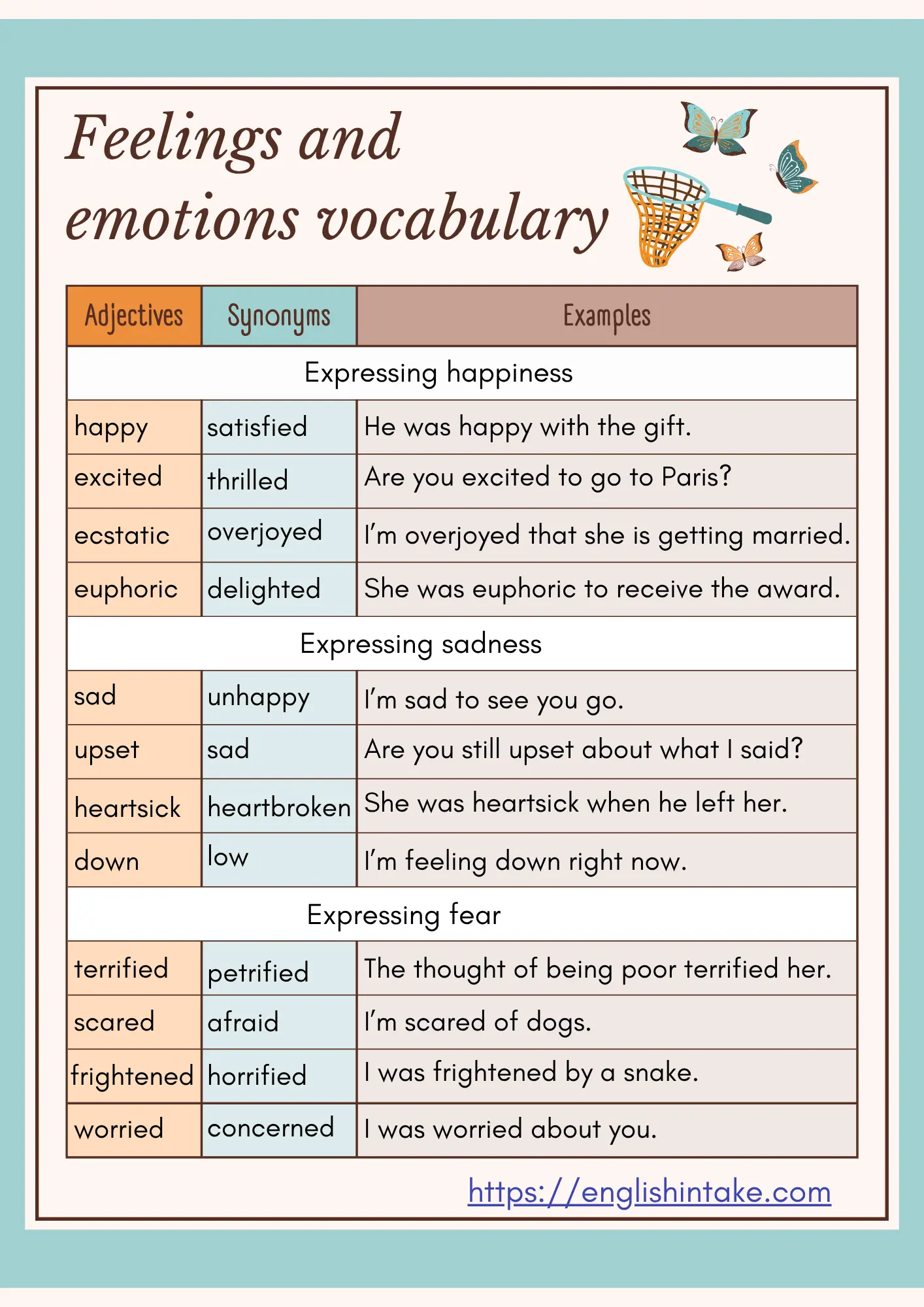1. How do you express your feelings and emotions?
This vocabulary lesson covers common phrases that you can use to express your feelings and emotions in English.
2. Feelings & emotions vocabulary quiz
Test your feelings & emotions vocabulary
Quick overview of the quiz!
- There are 7 questions
- You can track your time as you progress
- You get instant feedback on your answers
- You can check your results and review your answers at the end
Time: 00:00
Which adjective means “very happy and excited”?
What is the synonym of “content”?
Choose the antonym of “miserable”.
Which of the following adjectives describes a person who is extremely angry but unable to express it?
When you can’t wait for something pleasant to happen, you are ________.
I feel __________ to have a high-paying job.
Which adjectives describe the feeling of being angry because of something unfair?
Below is a list of 20 common adjectives you can use to express your feelings in English.
happyYou’re in a good mood because something nice happened.
I’m happy with with my salary.
sadYou feel down, usually because of a loss or disappointment.
He was sad to say goodbye to his friends.
angryA strong displeasure when something feels unfair or wrong.
Are you still angry with me?
excitedWhen you’re excited, you can’t wait for something to happen because they are fun, special, or important.
My sister is going to visit me next week. I’m so excited.
nervousYour body gets tense when you’re unsure about something.
I have a job interview tomorrow. I’m very nervous about it.
anxiousWhen you’re anxious, you keep thinking about what might go wrong.
Are you anxious?
confusedIt’s hard to make sense of what’s going on.
I was confused about what he meant.
frustratedYou want something to work, but it doesn’t, and that annoys you.
My son gets frustrated when he can’t find his toys.
disappointedThings didn’t go as you hoped.
She was disappointed when her team lost the match.
relievedSomething stressful is over, and you can finally relax.
He was relieved to find his lost wallet.
proudYou feel good about what you or someone else has achieved.
My son graduated last week. I’m very proud of him.
lonelyNo one is around, and you wish you had someone to talk to.
He felt lonely after the death of his wife.
embarrassedYou feel awkward because you made a mistake or did something silly.
She was embarrassed when she forgot her speech.
gratefulYou really appreciate something or someone.
I am grateful for your help.
surprisedSomething happens that you weren’t expecting.
He was surprised by the gift.
hopefulYou believe that good things are possible, even if they’re not here yet.
We are hopeful that our financial situation will improve in the near future.
boredNothing is interesting and time seems to pass slowly.
She was bored during the long meeting.
jealousYou wish (in a negative way) you had what someone else has.
He was jealous of his friend’s new car.
guiltyYou know (or feel) you did something wrong, and it bothers you.
She felt guilty for missing the appointment.
scaredThere’s danger or uncertainty, and your body reacts with fear.
The loud noise made him feel scared.
3. Describing happiness
Happiness is a warm, positive feeling that brightens our days and brings smiles to the faces of those around us. Here are some common expressions you can use to express your happiness in English.
Here is a list of adjectives that you can use to describe different levels of happiness. Click on the box to show the definition of the word.
joyful /ˈdʒɔɪfəl/Full of joy and happiness, often shown with enthusiasm.
It was joyful to celebrate my 90th birthday surrounded by so many friends and relatives.
delighted /dɪˈlaɪtɪd/Thrilled by something positive.
She was delighted with her birthday gift.
content /kənˈtɛnt/Comfortable with the current situation.
After a long day, he was content relaxing at home.
cheerful /ˈʧɪr.fəl/Showing a positive mood.
Her cheerful personality brightens the room.
ecstatic /ɛkˈstætɪk/Intense happiness or excitement.
She was ecstatic when she found out she got the job.
euphoric /juːˈfɔːrɪk/Overwhelmed by a sense of intense joy.
The euphoric crowd celebrated the team’s victory.
elated /ɪˈleɪtɪd/Uplifted and thrilled, usually after good news or success.
He was elated after winning the competition.
jubilant /ˈdʒuːbɪlənt/Showing great celebration, pride, or triumph.
The jubilant fans cheered on their team.
blissful /ˈblɪs.fəl/Extremely happy.
They spent a blissful week together on vacation.
gleeful /ˈɡliːfəl/Feeling satisfied.
She had a gleeful smile when she heard about her rival’s misfortune.
4. Expressing sadness
Sadness is a natural human emotion. People are sad when they encounter various challenging situations in life. This may include experiencing a loss, such as the death of a loved one, the end of a relationship, or losing a job. There are various expressions you can use in English to express sadness.
depressed /dɪˈprest/You feel deeply low and hopeless.
He’s been feeling depressed since he lost his job.
miserable /ˈmɪz(ə)rəb(ə)l/You’re really unhappy (everything feels uncomfortable or unpleasant).
I’m feeling miserable.
gloomy /ˈɡluːmi/A sad or grey mood, like when the weather matches how you feel inside.
You look gloomy today, what’s the matter?
sorrowful /ˈsɒrəfəl/You carry a deep sadness, often caused by loss or regret.
She felt sorrowful after hearing the sad news.
heartbroken /ˈhɑːtˌbrəʊkən/So upset it feels like your heart is in pieces.
She was heartbroken when her relationship ended.
dismayed /dɪsˈmeɪd/You feel shocked, sad or disappointed because things went badly.
He was dismayed by the outcome of the election.
despondent /dɪˈspɒndənt/You’ve lost hope and feel like nothing will work out.
After several failed attempts, he felt despondent about ever succeeding.
forlorn /fəˈlɔːn/You feel abandoned, lonely, and hopeless like no one is coming.
The forlorn puppy waited at the shelter for someone to adopt him.
downcast /ˈdaʊnkɑːst/You're sad or discouraged.
She felt downcast after her team lost the championship game.
disheartened /ˌdɪsˈhɑːtənd/You’ve lost your drive because things didn’t go your way.
The team was disheartened by their unexpected loss.
woeful /ˈwəʊfəl/Extremely sad.
Her woeful expression revealed how deeply the news affected her.
mournful /ˈmɔːnfəl/The kind of sadness that makes you feel like grieving.
The mournful song reminded her of her past.
doleful /ˈdəʊlfəl/You look or sound as if something really hurt your heart.
His doleful eyes conveyed his deep sadness.
dejected /dɪˈdʒektɪd/You’re down, disappointed, and it shows on your face.
She felt dejected after her hard work went unnoticed.
somber /ˈsɒmbə/Extreme sadness
The atmosphere at the funeral was somber.
dreary /ˈdrɪəri/When everything feels dull, grey, and heavy.
The endless rain made the day feel dreary.
lugubrious /luːˈɡjuːbriəs/You sound or look extremely sad, in a dramatic or poetic way.
The poet’s lugubrious verses reflected his inner turmoil.
dispirited /dɪˈspɪrɪtɪd/You’ve run out of motivation and everything feels a bit pointless.
The dispirited employees struggled to find motivation.
5. Expressing anger
Anger arises when we perceive injustice, threat, or frustration. People can feel angry when their expectations are not met, when they are treated unfairly, or when they experience a perceived attack on themselves or their loved ones.
irate /ˈīˌrāt/Showing strong anger that’s hard to contain.
His irate response surprised everyone in the room.
furious /ˈfjʊəriəs/Boiling with anger — completely outraged.
She was furious when she discovered the truth.
enraged /ənˈreɪdʒd/Taken over by violent or uncontrollable anger.
He became enraged when he found out he was being lied to.
indignant /ɪnˈdɪɡnənt/Angry because something feels unjust or offensive.
She was indignant about the accusations made against her.
resentful /rɪˈzentfəl/Holding on to bitterness about unfair treatment.
He felt resentful after being overlooked for the promotion.
agitated /ˈædʒɪteɪtɪd/Restless or upset — your body shows what your mind feels.
His agitated state was a clear indication of his anger.
incensed /ɪnˈsenst/So angry you feel insulted or deeply offended.
She was incensed by the blatant disregard for her feelings.
livid /ˈlɪvɪd/Extremely furious — almost speechless with rage.
He was livid when he discovered his car had been vandalised.
seething /ˈsiːðɪŋ/Quiet on the outside, but full of hidden anger inside.
She remained silent but was seething inside.
irritable /ˈɪrɪtəbəl/Easily annoyed or quick to snap at others.
He was irritable all day due to a lack of sleep.
cross /krɒs/A mild kind of anger — annoyed or slightly upset.
She was cross with him for not helping with the chores.
vexed /vekst/Frustrated or annoyed — something just keeps bothering you.
He was vexed by the constant interruptions.
exasperated /ɪɡˈzæspəreɪtɪd/Fed up and intensely frustrated.
She was exasperated by his lack of cooperation.
outraged /ˈaʊtreɪdʒd/A powerful mix of shock and anger — usually after injustice.
The community was outraged by the injustice they witnessed.
infuriated /ɪnˈfjʊərieɪtɪd/Anger has pushed your patience to the limit.
He was infuriated by the constant delays and setbacks.
6. Expressing fear
Fear is a response to perceived danger, threat, or uncertainty. You can feel fear when you face unfamiliar situations or confront potential harm.
frightened /ˈfraɪtənd/Scared by something sudden or unexpected.
She was frightened by the sudden loud noise.
petrified /ˈpɛtrəˌfaɪd/So afraid that you feel frozen and unable to move.
She was petrified when she saw the snake.
anxious /ˈæŋkʃəs/Worried about what might happen next.
She was anxious about her job interview.
apprehensive /ˌæprəˈhɛnsɪv/Nervous or unsure about the near future.
He was apprehensive about the outcome of the meeting.
uneasy /ʌnˈiːzi/Slightly nervous or uncomfortable about something.
She felt uneasy walking alone at night.
panicked /ˈpænɪkt/Overcome by sudden fear or anxiety.
She was in a panicked state after hearing the news.
horrified /ˈhɒrɪfaɪd/Shocked and scared by something awful.
They were horrified by the gruesome scene.
distressed /dɪˈstrɛst/Upset or anxious because something is wrong.
He was distressed about his friend’s accident.
tense /tɛns/Tight with worry or nerves, hard to relax.
She was tense before her presentation.
alarmed /əˈlɑːmd/Suddenly aware of danger or trouble.
She was alarmed by the sound of breaking glass.
terrified /ˈtɛrəfaɪd/Deeply scared, like facing your worst fear.
He was terrified of the dark.
daunted /ˈdɔːntɪd/Nervous or discouraged by something that seems too difficult.
She was daunted by the challenge.
7. How to ask about someone else’s feeling in English?
To show interest in how others feel, you can use the phrases below.
- How are you feeling?
- Are you okay?
- Is everything okay with you?
- Is everything alright?
- You look sad, what’s the matter?
- You seem upset, what’s wrong?
- Is there anything bothering you?
- Is everything alright with you?
8. Learning materials

